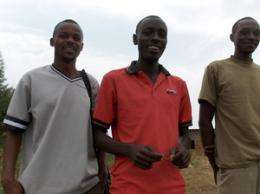Program improves health of orphans of Rwandan genocide

Rwandan children who lived through the horrors of the 1994 genocide may suffer from psychological trauma that makes them more vulnerable to health problems, such as HIV infection. But a medical school study shows that with mental health support, these youth can reduce symptoms of trauma, avoid risky behaviors and lead healthier lives.
The study, done in collaboration with a nonprofit in Rwanda, followed the progress of 120 children, now between the ages of 15 and 25, who lost their parents during the genocide and the years following that left nearly a million people dead and 600,000 children without parents. During the course of a year, the orphans in the study received individual and group counseling and were paired with adult mentors who helped guide them in daily life decisions.
At the end of the year, the youth showed a significant decline in trauma symptoms, better coping and social functioning and improved health as a result of less involvement in risky activities, said Annie Talbot, MD, clinical assistant professor of medicine and first author of the study.
“What we proved is that mental health intervention is linked to less risk behavior,” Talbot said. She presented the results of the study July 18 at the sixth International AIDS Society Conference on HIV Pathogenesis, Treatment and Prevention, held in Rome.
Talbot and her colleagues worked with the nonprofit Uyisenga N’Manzi, which provides housing, schooling and vocational training for some 4,000 Rwandan youngsters who were orphaned during the genocide. The pilot study, one of the few of its kind to assess children’s trauma and mental health, was designed to validate an approach that the group now expects to expand to children’s centers around the country, using a $1 million grant from the European Union, Talbot said.
At the outset of the study, the researchers questioned the randomly selected participants about their knowledge of HIV and found that 84 percent were well-educated about the disease as a result of a national HIV prevention campaign. And yet because of their past trauma, these youngsters were not likely to act on this knowledge. “Despite the fact that they are knowledgeable about HIV, they have high-risk behavior, so they don’t apply what they know to their daily lives,” Talbot said. “So while prevention education is good, for a majority of the population it has to be linked to mental health intervention.”
During the course of the study year, the participants had access to a variety of mental health services. Most went off to boarding school but returned home three times a year for “solidarity camp,” in which they talked in a group setting with trained counselors about the genocide and how it affected their lives. The participants discussed other important life issues, such as how to say no to a “Sugar Daddy,” how to manage aggression and how to deal with nightmares, Talbot said. They also could meet one-on-one with counselors.
While at school, the students would have monthly check-ins with the counseling staff. They were also given the opportunity to choose an adult mentor, a trained community member whom they could talk to anytime.
Three times during the year, the students were given self-questionnaires, standard psychological tools, to gauge their levels of post-trauma stress disorder and assess their general psychological and emotional health. Over the course of the study, their trauma symptoms declined by 11.6 percent, a statistically significant figure, Talbot said.
The participants also remained healthier. While one was found to be HIV-positive at the start of the study, none became newly infected during the course of the year. None of the 64 women in the group became pregnant during the study period.
















